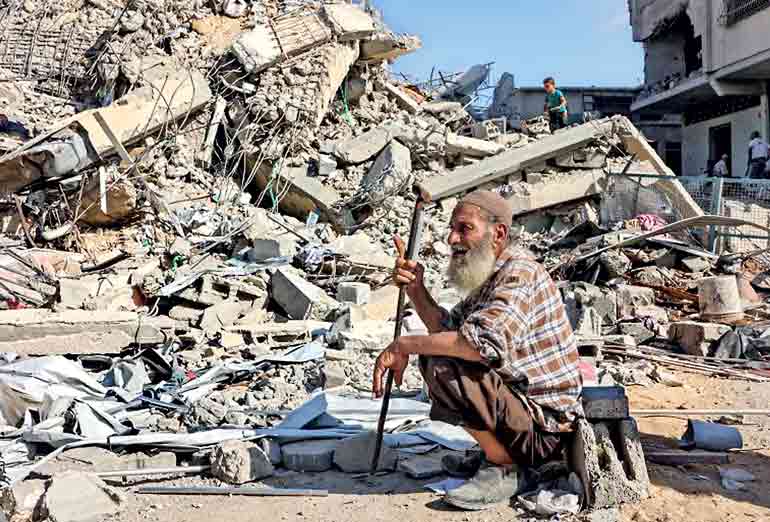Monday Feb 16, 2026
Monday Feb 16, 2026
Tuesday, 7 October 2025 00:22 - - {{hitsCtrl.values.hits}}

A man sits in the rubble of the collapsed Soussi Tower in Gaza City, which was destroyed last month by Israeli bombardment – (Omar al-Qattaa/AFP)
Yesterday was the Vap Poya (full moon) day. Today, on 7 October, the annual rains retreat (vassāvāsa) ends for Buddhist monastics across the Theravāda world, including those in Sri Lanka. In many temples and monasteries where the monastic residents have spent three months in retreat, following the Vinaya and ancient custom, it is time for the Kaṭhina, the ceremonial offering of a robe.
Over the centuries the Kaṭhina has become one of the most significant religio-cultural events for Buddhists, and this year is no different. Like most Buddhist families in the country, mine has also prepared for the Kaṭhina. My aunt has taken the responsibility for the ceremony this year in our ancestral village, a remote place nestled among the mountains of Sabaragamuwa, and the entire extended family is pitching in. Even those who are living thousands of miles away, such as myself, have been granted the privilege of taking part in this meritorious act.
Sharing merits with Gaza
We Buddhists believe in the ancient idea—even though it is not part of early Buddhist teachings—that we can share the merits accrued by our good deeds with other people, both living and dead. In the case of the former, we invite them to rejoice at what we have done, and through that mental solidarity, it is said that they reap the karmic benefits. In the case of the latter, we believe that in their new life after death, if they happen to be in a position to see what we do, they will still be able to rejoice in our good deeds and thus enrich their own karmic balance. This exchange is called puññānumodanā in Pāli.
As an academic in Buddhist studies, I am well aware of the scholarly discussion around puññānumodanā. As a member of the Buddhist community, I am not too bothered by the incongruences between doctrine and custom here. I find it a beautiful and blameless practice, and that is sufficient for me to engage in it.
 So, this year, as I join my family in offering the Kaṭhina robe to the monastic community of the small temple in our rural, ancestral village, I share the merits with people who have often occupied my thoughts in recent times.
So, this year, as I join my family in offering the Kaṭhina robe to the monastic community of the small temple in our rural, ancestral village, I share the merits with people who have often occupied my thoughts in recent times.
I share the merits with the babies of Gaza, born into a world that is burning and exploding, a world that is able to abandon them to starve to death, as happened to the infants in the Al-Nasr Children’s Hospital, when the staff was forced to abandon the building and were not able to return due to intense bombardment, infants whose decomposing bodies were found later, lying on the beds they were left in, still connected to defunct medical devices.
I share the merits with the toddlers of Gaza, in whom I see my own little daughter, in whose parents I see myself, who get bombed as they sleep at night in their tents, and whose pain as they get their limbs amputated without anaesthesia rips my heart, toddlers who get carried into the few barely operational hospitals, running low on staff, medicine, and resources, and die by injuries that should not cost them their lives in a humane world.
I share the merits with the children of Gaza, whose sense of wonder somehow remains intact even during an ongoing genocide as they play among the rubble, whose hunger remains unalleviated as they scavenge for scraps of food, whose lives are brutally extinguished as they wait in line to collect water, and if they manage to survive for a while with injuries, whose last few, laboured breaths are captured on video and shared with the world by helpless onlookers and get seared into my mind.
I share the merits with the women of Gaza, who carry their families on their backs—even literally, as they carry their children on the relentless march to the South, in search of respite that never comes—and who are the bedrock of a culture that remains steadfastly resistant under tremendous odds, women who starve as they feed the next generation, whose love transcends their own lives when even their dying bodies nurture babies that get taken out from their wombs to live a while longer.
I share the merits with the men of Gaza, who remain brave in the face of utter powerlessness, who grieve in silence and wail in despair, who risk their lives time and again to protect their loved ones, who are vilified even as the world talks about their women and children, who are assumed to be terrorists until proven otherwise by a settler-colonial judge, jury and executioner that requires them to be nothing but terrorists, and who are condemned to die in a thousand horrific ways for the sin of being born Palestinian.
Being a Buddhist does not stop us from standing for what is just and right, and we can take that stand while upholding Buddhist principles. In Sri Lanka, this means, at the very least, educating ourselves about what is actually happening in Gaza and the historical context of this genocide, not just about what happened two years ago on 7 October 2023, but also the many decades of brutal colonial subjugation that preceded it. I am disappointed at the number of Buddhist Zionists—an oxymoron if there ever was one—we seem to have in Sri Lanka, but this appears to be largely a matter of ignorance (whereas I have nothing to say to those who are driven by blatant Islamophobia)
Mettā for Gaza
Dāna—giving, of material things as well as karmic merit—is good, but the most meritorious and skilful act is meditation, according to the Buddhist teachings. One of the best known and most popular forms of meditation is mettā, universal love.
On this day after the Vap Poya day, as my family engages in the Kaṭhina ceremony, I will cultivate a mind of love towards the people of Gaza. Perhaps it would help me more than it helps them in any meaningful way, but at the very least it will ensure that whatever other work I do is done with a skilful frame of mind.
In my mind’s eye I will see that tiny stretch of land hugging the Mediterranean, that ancient hub of trade and cultural exchange at the gate to West Asia, home to what used to be more than two-million people just two years ago, though that number is greatly diminished now in the genocide. I will picture the people of Gaza, young and old, men and women, and I will imagine bathing them in a gentle glow of love, where they shall remain safe from any harm.
Perhaps one of those infamous drone footages from the Israeli military, where the people of Gaza look like swarms of ants, will help me in this regard, as it offers me a sense of scale. And perhaps their assistance here might be the stepping stone to extend my mettā to Israelis just across the wall, not only to the people but also their genocidal leader Benjamin Netanyahu, and perhaps his even more extremist sidekicks such as Bezalel Smotrich and Itamar Ben-Gvir.
I anticipate that very last extension of mettā to a genocidal leadership would not be without difficulty, but then I shall think: If I were born where Netanyahu was, and if I were brought up the way Smotrich was, and if I were to end up where Ben-Gvir has, perhaps I too would be cultivating genocidal thoughts. As my Muslim brethren might put it, there but for the grace of Allah go I.
May Allah, the merciful and compassionate, help me cultivate a mind of love towards even those perpetrators of genocide on this Kaṭhina day.
Pacifism is not political impotence
Legend has it that even the Buddha attempted, in his ever so peaceful way, to prevent the king Vidudabha of the powerful Kosala monarchy from annihilating Sakya, the small republic at the foot of the Himalayas from which the Buddha hailed.
In one story in the commentary to the Dhammapada verse 47, it is said that the Buddha was sitting by the side of the road, alone under the scorching sun, as the army of Vidudabha was marching towards Sakya. Vidudabha saw the Buddha and asked why he was sitting in the sun and not under the shade of a great Banyan tree that was just nearby.
“Be not concerned, great king. The shade of my kinsmen keeps me cool,” replied the Buddha, it is said. Apparently Vidudabha was inspired by this conversation to not go to war with Sakya, at least for a while longer.
We are not Buddhas, and the genocide in Gaza is not a legend. Nonetheless, we owe it to the people of Gaza that we do not stay silent, even if what we do in our limited capacities as individual citizens seems futile. Being a Buddhist does not stop us from standing for what is just and right, and we can take that stand while upholding Buddhist principles.
In Sri Lanka, this means, at the very least, educating ourselves about what is actually happening in Gaza and the historical context of this genocide, not just about what happened two years ago on 7 October 2023, but also the many decades of brutal colonial subjugation that preceded it. I am disappointed at the number of Buddhist Zionists—an oxymoron if there ever was one—we seem to have in Sri Lanka, but this appears to be largely a matter of ignorance (whereas I have nothing to say to those who are driven by blatant Islamophobia).
In the Netherlands, where I currently live, being Buddhist during genocide has meant, among other things, raising our voices against funding these crimes against humanity. According to research by the Centre for Research on Multinational Corporations, the Netherlands is the largest investor in Israel among all EU states by a huge margin. Just a few days ago, the Dutch Prime Minister Dick Schoof, in an interview with Al Jazeera, denied that there is a genocide happening in Gaza. Perhaps he was more concerned about representing the corporate interests of the country than the public will.
In other words, the government that I pay taxes to is one that funds the genocide and helps perpetrate it. In that sense, I am responsible for what happens in Gaza, and it is my historical responsibility to protest against it. I will do so with the knowledge that I share far more with those who are being exterminated than the executioners empowered by my tax Euros.
(The writer is a social anthropologist whose research interests are at the intersection of early Buddhism and contemporary Buddhist practice, particularly in the Sri Lankan forest tradition.)